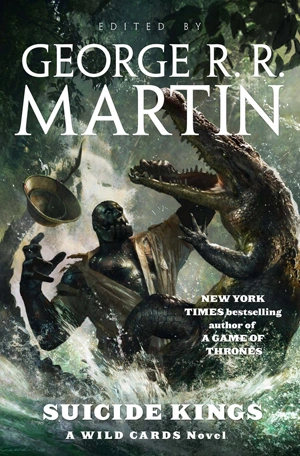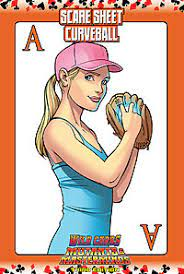There is a real sense in which Fort Freak is a throwback to the early days of the series. After the more international scope of the previous books, Fort Freak is a return to the New York setting of the early novels, especially Jokertown.
In this book, most of the action centers on the titular Fort Freak, the Jokertown police precinct and its officers, superpowered or otherwise. In doing so, the book offers a superhero spin on police procedurals and detective stories. This time around, the main story of the book is a murder mystery: A mysterious party is willing to do anything, even kill, to cover up the truth of a shooting that happened at a local diner in the 1970s. As per Wild Cards tradition, various characters are drawn into the conspiracy as they try to uncover the truth behind the killings.
This time the interstitial stories are:
The Rat Race (by Cherie Priest: starring Leo Storgman/Ramshead
): Detective Leo Storgman was a detective in Jokertown for a long time before he became a Joker himself. Now approaching mandatory retirement age, his last day on the job takes a turn for the strange. A fire at a local courthouse appears to have been set deliberately to conceal evidence from a diner shooting he worked in the 1970s. With free time on his hands, Storgman sets out to investigate the case. A hard-boiled detective story, “The Rat Race” provides a good spine for the book. The relatively low key-nature of Storgman’s powers (he essentially has super-headbutting abilities) means that he has to rely on his wits and his guts like all the best literary detectives. Rating: 4/5.
Faith (by John Jos. Miller, starring Father Squid): Since his first appearance, Father Squid has been one of the moral centers of the Wild Cards series. The kindly priest has always seen to the religious needs of the people of Jokertown with kindness and a message of non-violence. But Father Squid has been living with a secret, one related to the diner shooting, and Leo Storgman’s investigation threatens to reveal it. Unfortunately, this story depends a lot on the idea that Father Squid could be the killer which would contradict his entire established characterization. The red herring was so obvious that it had the effect of spoiling the mystery as I was able to figure out the killer by shear process of elimination. Rating: 3/5.
Snake Up Above/Snake in the Hole/Snake on Fire (by David Anthony Durham, starring Marcus Morgan / Infamous Black Tongue): Marcus Morgan is not having an easy adjustment to life in Jokertown. Chased out by his family when his Joker ability left him with the lower half and venomous bite of a snake, he finds that Jokertown can be dangerous for a newcomer. However, even he didn’t expect to be framed for murder and declared public enemy number one. Now, he’s going to have to fight to clear his name. Of the new characters introduced this book, Marcus Morgan, the Infamous Black Tongue, is one of my favorites. A neat visual with a cool super-power goes a long way. Rating: 4/5.
---And All The Sinners Saints (by Victor Milan and Ty Franck, starring Charles Herriman/ Flipper and Vincent Martinelli/ Ratboy): The obligatory buddy cop story, kind of. Charles “Flipper” Herriman is a public defender whose flippers for hands have left him lacking in confidence. Confidence is something internal affairs officer Vincent “Ratboy” Martinelli has in spades despite literally being a giant rat. When they get pulled into the Marcus Morgan murder investigation and discover evidence that he is the victim of a frame-up, they have to work together to bring the real perpetrator to justice. If you’ve ever seen one of the movies this story is riffing on, you know that the real fun is seeing how the two leads bounce off each other. In that respect, this story works well, triggering my fond memories of 90s era action films. Rating: 4/5.
The one off stories in the book are:
The Rook (by Melinda Snodgrass, starring Francis “Franny” Xavier Black): Francis Xavier Black is starting his job as a police detective on the wrong foot. The son of original trilogy villain, crooked cop John F.X. Black, Franny wants to follow in (what he thinks) was his father’s legacy of honorable policing. Unfortunately, on his first day on the job, he’s antagonized his coworkers and made an enemy of a minor but extremely annoying Ace. Worse, a Joker girl that he arrested is being brought up on trumped-up charges. To get justice, Black is going to take the law into his own hands. Black is the most interesting character in this book, a step closer to the classic Wild Card anti-heroes: his straightforward good-guy nature hides hints of something darker beneath the surface. A solid stand-alone story. Rating: 4/5.
Sanctuary (by Mary Ann Moharanj, starring Kavitha/Natya): Kavitha aka Natya is a dancer whose Ace ability to generate light when she dances has made her a celebrity. She is happy enough, living with her police detective boyfriend, Michael, and their child, but sometimes wonders if she could be doing more with her powers. She gets that chance when Michael’s ex-girlfriend, Minal, comes back into their lives. Minal has witnessed a murder and now she’s being hunted by a dangerous gang. But what starts as at temporary arrangement begins to change quickly as both Natya and Michael develop feelings for Minal. Although the story builds to a superhero fight scene, it is an exploration of a super-powered throuple first and everything else second. Rating: 3/5.
Hope We Die Before We Get Old (by Stephen Leigh, starring the Oddity): The three people who have been fused into the twisted vigilante known as the Oddity have been protecting Jokertown for over 30 years. Unfortunately, one of Oddity’s selves has begun to suffer from early onset Alzheimer’s which results in uncontrolled rampages. Worse, the Oddity has discovered that early in their career they may have killed an innocent man. Soon the Oddity is going to have to make a choice where no matter what happens the being called the Oddity will be no more. A poignant end to an underutilized character. Unfortunately, Stephen Leigh does not have room to fully explore the consequences of a hero killing the wrong person and the story is harmed as a result. Rating: 3/5.
More! (by Paul Cornell, starring Abigail Baker): Abigail Baker is a struggling actress in New York who has just gotten her first major role—which means that it’s a bad time for her ability to copy the Ace power of others to go haywire. But that’s what happens when she meets Croyd Crenson, the Sleeper, who is on the run from both the police and the underworld. When her power fluctuations make her a person of interest to Croyd’s pursuers she is going to need to do everything she can to avoid being arrested or worse if she wants to make it to opening curtain. The mandatory fun caper story. I wasn’t so fond of this one originally but the more I thought about it the more it grew on me. The world of Wild Cards can be a dark place so it’s nice to see a more light-hearted take on it every now and again. Rating: 4/5.
The Straight Man (by Kevin Andrew Murphy, starring James McTate/ Slim Jim): Police officer James “Slim Jim” McTate is an unusual case. His transformation into a Joker-Ace left him unusually tall and thin and grants him the ability to turn himself and objects he happens to be holding two dimensional. Odd looking enough that he can’t easily pass for normal, he is not so odd looking that he can easily fit in with the other Jokers of Jokertown. Jim has to adjust to his new home quickly when he assigned to investigate the teleporting jewelry thief known as the Magpie. This story is for the long time fans, showing us old characters and ultimately tying back to the very beginning of the series in an unexpected way. A real treat for someone who started from back in Book One but a good story for newcomers as well. Rating: 4/5.
As you can see from the ratings, this was a good book --- but not an extraordinary one. The new characters were fun if a little bland. Most of them are pretty basic “good guys.” With the exception of Franny Black, the characters with the most depth are returning characters like the Oddity or Father Squid. Still, if it’s not exceptional, it’s still one of the better books in the series so credit where credit is due.
Addendum: In addition to the new protagonists introduced in this book, we meet Raul Esposito, formerly the hitman known as the Button Man, and mongoose like Joker police officer Miranda "Rikki" Michaelson. Ice Blue Sibyl, a minor character introduced back in the original trilogy, begins to take on more prominence.














